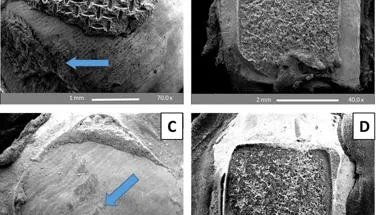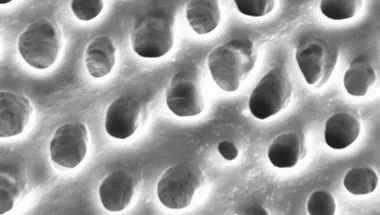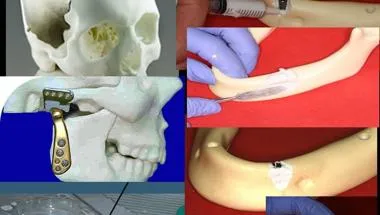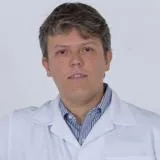Biomaterials for regenerative medicine & dentistry.
The Deb laboratories have a strong background in biomaterials chemistry and focusses on developing innovative novel biomaterials suited for technology transfer through to clinical translation. The aim is to harness polymeric and ceramic biomaterials and tailor their properties to solve unmet biomedical needs.
Video: Porous scaffolds for bone tissue engineering.
Projects
Biomimetic bone graft substitutes
A large proportion of orthopaedic, craniofacial and spinal surgical procedures require bone grafts and despite significant advances synthetic bone grafts suited for clinical translation face many challenges. To address these barriers, we are designing both acellular and cell-seeded scaffolds to provide enough vascularisation, adequate mechanical strength, whilst imbibing properties to support osteogenesis. Composite based porous scaffolds are being designed to allow rapid translation into surgical procedures where a bone graft substitute is required. Key features of the biomaterials being developed are in line with clinical requirements that can encourage tissue remodelling. Our approaches include: • Design of biomimetic and bio-instructive biomaterials for craniofacial defects, and musculoskeletal repair • Orthobiologic grafts • Elastomeric tough hydrogel composites • Bioreactor based bone tissue engineering

Biomaterials in relation to dentistry
Aesthetic restoration of teeth, minimising tooth sensitivity, orthodontic and endodontic treatment are some dental treatments that has seen a huge increase. However, certain clinical challenges exist, and we are using biomaterials chemistry approaches to resolve these issues through different projects: - Smart biomaterials to function as dentine substitutes, composites with self-sealing ability for endodontic treatments and surface modification of titanium via click chemistry for periodontal regeneration. -Using material chemistry to explore novel techniques in orthodontic bonding that can result in clinically acceptable bond strengths, induce enamel re-mineralization, leave minimal remnant adhesive, and surmount enamel damage encountered upon bracket removal. - Smart synthetic polymer composite films for guided tissue regeneration specifically for periodontal ligament regeneration and wound dressings.

Tackling the biodegradation of resin-dentine interfaces in dental restoratives
Polymeric adhesive systems play a significant role in operative dentistry and has paved way for both minimally invasive and aesthetic dentistry. Dental adhesives provide a retentive adhesive interface between dentine and the restorative however the longevity of this bond depends on the integrity of the interface. Both enzymatic and hydrolytic degradation are the main causes of the breakdown of this bond responsible, which results in failure through marginal discolouration, breakdown and eventual loss of the restoration. We are exploring ways of enhancing the longevity of this resin-dentine interface by: • Inhibition of Matrix Metalloproteinase (MMP) • Adhesive with remineralisation and inhibition of hydrolysis • Antibacterial and MMP inhibition in bonding systems
Publications
The publication feed is not currently available. This could be due to a server fault or an incorrect feed address, please check the feed is valid and the Pure site is up.Awards
2016 – 2018 King’s College Innovations (KCI Health Accelerator funding) – Remineralisation and desensitisation of teeth with a novel biocompatible chemistry.
(Co-PI with A Banerjee, TF Watson & G Koller) £150,000
2014-2016 BED implants - Development of novel biomimetic engineered dental implants for periodontal ligament regeneration; EC - European Commission; £244,296.00 (Research contract visiting fellowship)
Activities

MRes in Tissue Engineering & Innovation Technology
Professor Deb has developed this research-based course in Tissue Engineering & Innovation Technology, which is being launched in September 2019. The course will provide students from dental, medical, biological, imaging or engineering related backgrounds the specialist knowledge and research skills to pursue a career in this field.
External Activities
Chair of the Royal Society of Chemistry: Biomaterials Chemistry Interest Group.
Projects
Biomimetic bone graft substitutes
A large proportion of orthopaedic, craniofacial and spinal surgical procedures require bone grafts and despite significant advances synthetic bone grafts suited for clinical translation face many challenges. To address these barriers, we are designing both acellular and cell-seeded scaffolds to provide enough vascularisation, adequate mechanical strength, whilst imbibing properties to support osteogenesis. Composite based porous scaffolds are being designed to allow rapid translation into surgical procedures where a bone graft substitute is required. Key features of the biomaterials being developed are in line with clinical requirements that can encourage tissue remodelling. Our approaches include: • Design of biomimetic and bio-instructive biomaterials for craniofacial defects, and musculoskeletal repair • Orthobiologic grafts • Elastomeric tough hydrogel composites • Bioreactor based bone tissue engineering

Biomaterials in relation to dentistry
Aesthetic restoration of teeth, minimising tooth sensitivity, orthodontic and endodontic treatment are some dental treatments that has seen a huge increase. However, certain clinical challenges exist, and we are using biomaterials chemistry approaches to resolve these issues through different projects: - Smart biomaterials to function as dentine substitutes, composites with self-sealing ability for endodontic treatments and surface modification of titanium via click chemistry for periodontal regeneration. -Using material chemistry to explore novel techniques in orthodontic bonding that can result in clinically acceptable bond strengths, induce enamel re-mineralization, leave minimal remnant adhesive, and surmount enamel damage encountered upon bracket removal. - Smart synthetic polymer composite films for guided tissue regeneration specifically for periodontal ligament regeneration and wound dressings.

Tackling the biodegradation of resin-dentine interfaces in dental restoratives
Polymeric adhesive systems play a significant role in operative dentistry and has paved way for both minimally invasive and aesthetic dentistry. Dental adhesives provide a retentive adhesive interface between dentine and the restorative however the longevity of this bond depends on the integrity of the interface. Both enzymatic and hydrolytic degradation are the main causes of the breakdown of this bond responsible, which results in failure through marginal discolouration, breakdown and eventual loss of the restoration. We are exploring ways of enhancing the longevity of this resin-dentine interface by: • Inhibition of Matrix Metalloproteinase (MMP) • Adhesive with remineralisation and inhibition of hydrolysis • Antibacterial and MMP inhibition in bonding systems
Publications
The publication feed is not currently available. This could be due to a server fault or an incorrect feed address, please check the feed is valid and the Pure site is up.Awards
2016 – 2018 King’s College Innovations (KCI Health Accelerator funding) – Remineralisation and desensitisation of teeth with a novel biocompatible chemistry.
(Co-PI with A Banerjee, TF Watson & G Koller) £150,000
2014-2016 BED implants - Development of novel biomimetic engineered dental implants for periodontal ligament regeneration; EC - European Commission; £244,296.00 (Research contract visiting fellowship)
Activities

MRes in Tissue Engineering & Innovation Technology
Professor Deb has developed this research-based course in Tissue Engineering & Innovation Technology, which is being launched in September 2019. The course will provide students from dental, medical, biological, imaging or engineering related backgrounds the specialist knowledge and research skills to pursue a career in this field.
External Activities
Chair of the Royal Society of Chemistry: Biomaterials Chemistry Interest Group.
Group lead
Contact us
Professor Sanjukta Deb
Professor in Biomaterials Science
Guy's Tower Wing
Guy's Hospital




